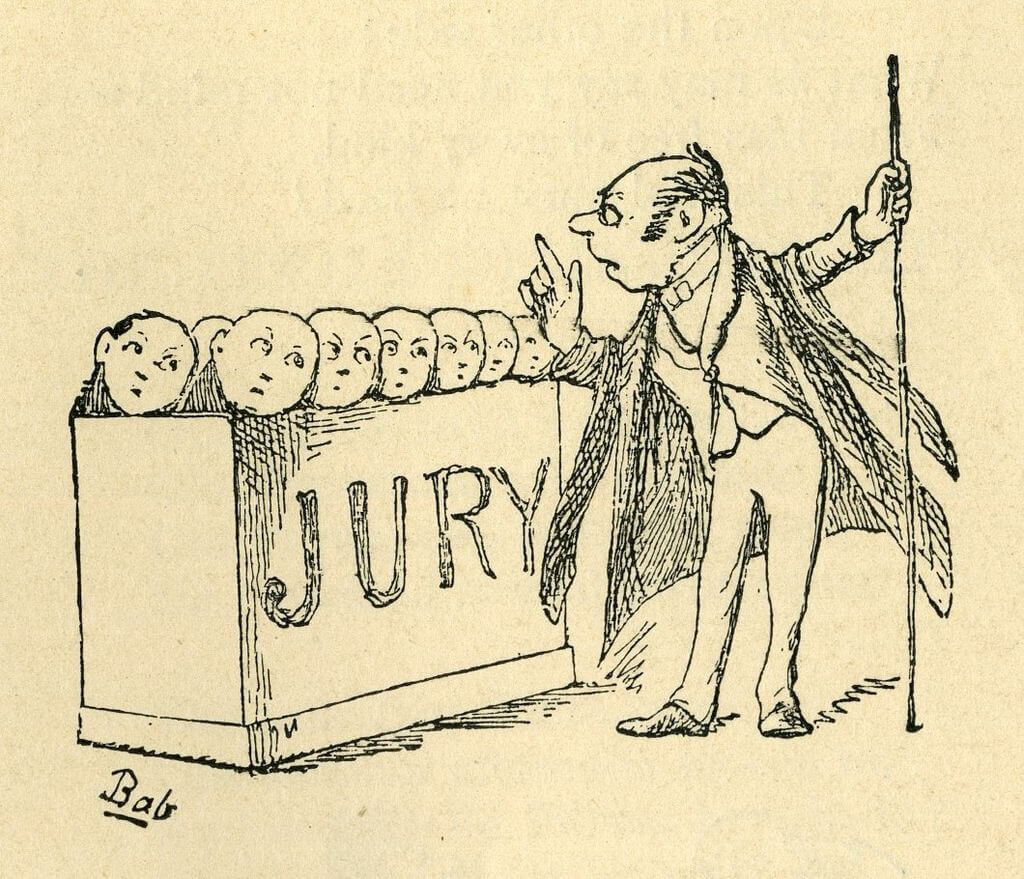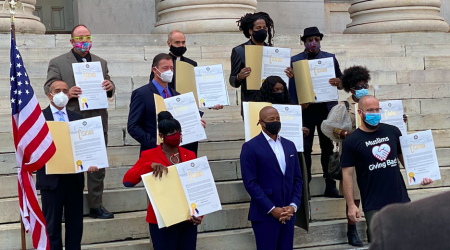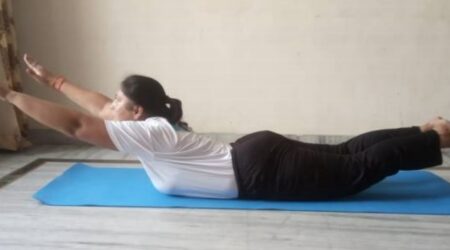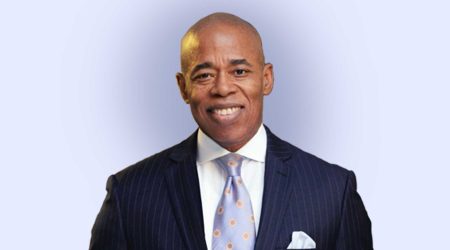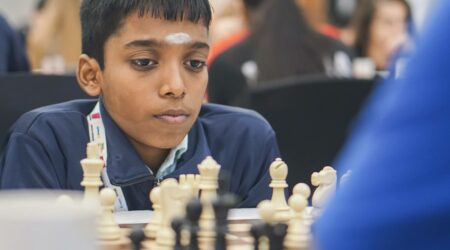The right to a jury trial is guaranteed in the US constitution.
By Basab Dasgupta
I became interested in our justice system after I received my first summon for jury duty. The US judicial system uses jury trial in deciding a wide variety of court cases. I found it both fascinating and puzzling.
The basic concept is simple. Lawyers for both the accuser (plaintiff) and the defendant call their respective witnesses in front of a jury, consisting of 12 impartial citizens and present all the relevant evidence in the case. The judge would decide what pieces of evidence are allowed and give appropriate instructions to the jury. The lawyers would guide their respective clients to tell their version of the conflict and cross-examine the opposing clients, finally summarizing the case in closing arguments. The ultimate verdict would be given by the jury. In some cases, the defendant can request a “bench trial” i.e., a decision by the judge. Misdemeanors and other less serious charges are always decided by a judge in “small claims” court or traffic court. I learned later that the right of a jury trial is guaranteed in the US constitution.
Puzzling aspects of a jury trial
The verdict has to be unanimous in all criminal cases but not in civil cases. If a criminal jury cannot reach a unanimous decision, then it is called a “hung jury” and the judge is obligated to declare it to be a “mistrial”. The prosecuting party can request a new trial and start all over again. There is a “double jeopardy” rule. If a defendant is found not guilty, he/she cannot be tried again for the same offense. Once the verdict is reached, it is up to the judge to decide the appropriate punishment. Although there are guidelines about the right punishment for any given crime, the judge seems to have a lot of latitude in deciding the sentence within those guidelines. In some states, the punishment is also decided by the jury. Even after the trial and sentencing are over, the guilty party has a number of appeals to either reverse the decision or request a new trial.
Twelve members of the jury are chosen jointly by attorneys from both sides out of a randomly collected larger group of “peers” i.e., our fellow citizens. All US citizens are periodically summoned for jury duty. Their names and addresses are probably selected from a voters’ registration list. This is a random process and typically happens every five to ten years.
Civic duty
Three aspects of jury duty are notable. If one reports for jury duty, one is entitled to a modest amount of “per diem” money during the period covered by this duty Secondly, the employers are required by law to release the employees for jury duty, regardless of the urgency or importance of their work. Jury duty is a citizens’ responsibility. Thirdly, there are a number of ‘excuses’ one can use to get out of the obligation of jury duty. It can be illness, relocation, death in the family, weather etc.
“Smart” people manage to get out of this obligation one way or another because they consider it to be a huge waste of time. As a result, what is left in the jury pool are probably the poorer, less intelligent and more naïve people who take this job seriously or who probably have nothing better to do in their lives. This may not be bad. When your fate is in the hands of twelve strangers, you would probably want them to be as far remote from the reality as possible. Jury duty is regarded as a civic duty and everyone who is summoned is required to respond in some way. I do not know what the penalty is if someone simply ignores the jury summon.
Women were not allowed to participate in jury duty in this country until the late nineteenth century, partly because they were considered to be less intelligent and partly because they had supposedly more important tasks at home. Different states introduced women jurors at different times, the most recent one being Mississippi in 1968!
During my first two jury duties, I reported for duty and basically just waited for two or three days without doing anything just to see if my name would be called for a formal interview by the attorneys. There was a tremendous waste of time in this ordeal. The waiting process was boring. There was no TV, no newspaper or magazine to read, no cafeteria nearby and no cell phone.
Domestic violence case
Third time was a charm. I was actually called to be interviewed. It was a domestic violence case. The wife was suing the husband for physical and verbal abuse. It was held inside a real courtroom. I was seated in a witness box and there was a judge along with a whole bunch of legal people. I was repeatedly asked by lawyers from both parties about my own married life and my relationship with my wife. After a while, it became clear to me what they were really trying to get out of me. Being an Indian and the Indian society being a male-dominated society, they were checking out if I had any inherent bias in favor of a husband’s complete control over wife in domestic life.
I was so exasperated that at one point, I told the judge, “Your honor. Contrary to popular belief, the Asian Indians do not routinely beat up their wives”. There were a few chuckles. Even the judge smiled.
Not surprisingly, I was not chosen to be a jury member. Perhaps I was judged to be a little too witty to become a juror. I felt a little sad because I was all hyped up at the thought of going through a trial.
My fourth and final appearance for potential jury duty took place three years ago. I hated the chore because I had to get up early in order to reach the Santa Ana Superior CourtHouse by seven in the morning. It was a drizzly, foggy, windy cold morning and driving was no fun. The designated parking building was two blocks away from the courthouse.
As the announcer started explaining the protocol, at one point she said, “If any of you is above 70 and suffering from some medical condition that requires frequent attention, then you might be excused”. I thought, “Bingo, that is my way out of this because I have type II diabetes”. I was in no mood to sit through the entire day among the crowd I saw around me. I went to the information counter to apply for my waiver. I exaggerated the severity of my health condition a little bit, by saying that I had to take medication at regular intervals and had to eat several times in small portions.
I got more good news. She told me that if I filled out an appropriate form, I would be permanently excluded from receiving any future jury summons. Needless to say, I did exactly that and I will never have to go for jury duty ever again!
I left the courthouse happy. On my way back, I started to think through this whole jury system. I always felt that the criminal justice system in this country is biased in favor of criminals. People literally get away with murder and in any event, all trials seem to be long dragged-out processes costing the taxpayers a ton of money. When you ask a random collection of 12 people to agree on almost anything, it is natural that it would take a long time and there would be a tendency to go easy on the crime because you must not have “any reasonable doubt” in your decision of a guilty verdict.
The jury selection process is a long ordeal. It must first be determined that the potential jurors are either completely ignorant about the case involved or at least, truly unbiased. The attorney for either party can dismiss a jury without even giving a valid reason. Then there is the possibility of a juror being thrown out during the trial because of some “jury misconduct”, which can be any violation of the judge’s instructions. Two additional “alternate jury members” are chosen just for this possibility.
India said no
Many countries including India have moved away from conducting jury trials to bench trials. The infamous Nanavati case was first considered in a trial by a jury and Nanavati was acquitted. The verdict was overturned because of some legal irregularities and a bench trial found him guilty. That case was a catalyst to bring a formal end to jury trials.
It is a philosophical question how the human beings should be judged and punished for the crimes they commit by other humans. I am in favor of using objective scientific evidence as much as possible and perhaps even artificial intelligence and minimizing subjective decisions by a judge and a jury, based on their various biases and emotions.


